Aug 30, 2024
Strengthening sustainable practices: High-level Pakistani delegation visits TUD to gain insights into textiles sector
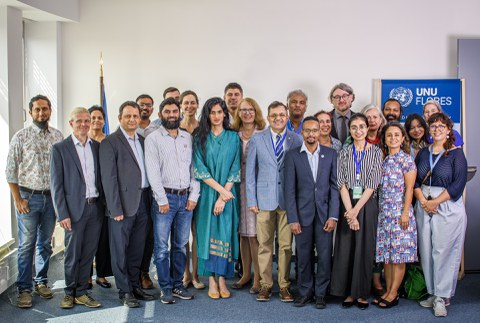
Kickoff event of the delegation visit from August 26-30, 2024, on best practices in the textile sector
The Centre for International Postgraduate Studies of Environmental Management (CIPSEM) at TUD co-hosted a high-level delegation from Pakistan, comprising representatives from the Ministry of Climate Change and Environmental Coordination, leading textile industries in Pakistan, and WWF-Pakistan. From 26–30 August, the visit was a vital component of an eight-year EU-funded project on “International Labor and Environmental Standards Application in Pakistan's SMEs (ILES)” to implement environmental standards in Pakistan's textile sector. This visit was a joint effort with the United Nations University Institute for Integrated Management of Material Fluxes and Resources (UNU-FLORES).
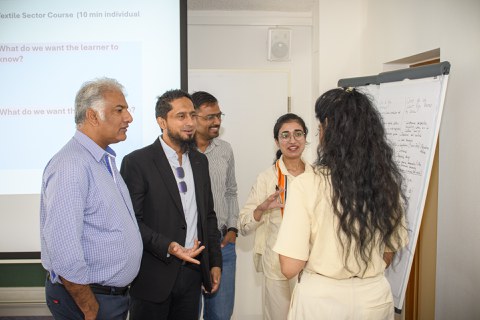
The Pakistani delegation provides input on capacity building needs for fine-tuning a higher-education in-classroom and online-course on sustainability in the textile industry.
This week-long exposure visit focused on exchanging lessons learned and exploring best practices in Germany's textile sector to foster a deeper understanding of sustainable and circular practices. The delegation engaged with various local institutions, including UNU-FLORES, the Institute of Textile Machinery and High-Performance Material Technology (ITM) at TUD Dresden University of Technology, and the Sustainable Textile Division at TU Chemnitz. These engagements aimed to highlight innovative approaches such as sustainable materials, recycling techniques, and circular design principles, which can potentially transform the textile sectors in both countries.
The agenda included a series of site visits and discussions with key stakeholders. On Monday, 26 August, the delegation's visit began with introductions and presentations at UNU-FLORES, where representatives from CIPSEM, UNU-FLORES, and other local and international partners welcomed them. The sessions featured insights into the textile sector from WWF Pakistan and discussions on sustainable practices facilitated by leading institutions such as the Global Water and Climate Adaptation Centre (ABCD-Centre) and the Saxon State Ministries (SMWA, SEMKUL).
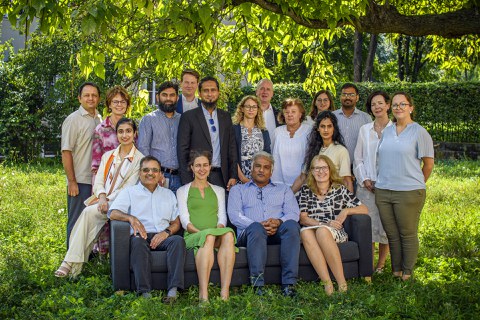
Exchange between the delegation members from the Pakistani Ministry of Climate Change and Environmental Coordination, leading Pakistani textile companies, and WWF-Pakistan with local stakeholders, GIZ, and BMZ on the 3rd day of the expert visit.
Ongoing research and educational projects emphasizing resource management and sustainability in textile manufacturing were introduced by UNU-FLORES, ITM, TU Chemnitz, as well as the Circular Saxony cluster and RKW Sachsen, a local Saxon support network for small- and medium-sized businesses.
The circular economy experts of adelphi provided timely input on the implications of the German Act on Corporate Due Diligence Obligations in Supply Chains and the European Corporate Sustainability Due Diligence Directive for the textile industry.
Representatives of GIZ and the German Federal Ministry for Economic Cooperation and Development (BMZ) discussed ongoing collaboration initiatives relevant to the Pakistani textile sector, such as the Partnership for Sustainable Textiles, the Asia Garment Hub, and the emerging helpdesk architecture by the EU.
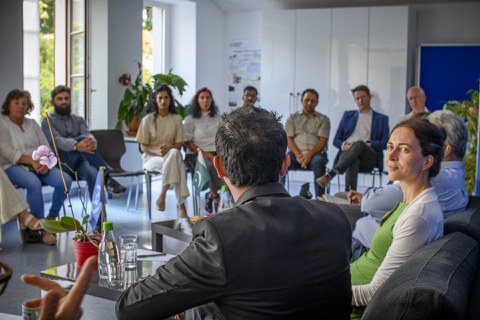
Discussion round on advancing sustainability in the textile industry with a focus on international education and capacity building intiatives.
A panel discussion at CIPSEM highlighted ongoing collaborative educational activities while exploring ways to enhance capacity-building efforts for sustainability in the textile industry. Significant capacity-building opportunities are in place, including a curriculum for a BSc in Textile Engineering co-designed by ITM (TUD) and UNU-FLORES at Ahsanullah University Bangladesh, the DAAD-supported MSc on Textile Machinery and High-Performance Material Technology at TUD, the training activities run by CIPSEM, and ongoing educational activities by frontrunners in the Pakistani textile industry along the upstream value chain, starting from regenerative cotton farming practices. However, considering the size of the textile industry, more coordinated efforts on a larger scale are necessary for an integrated understanding and optimization of processes along the value chain. It also became apparent that the problems caused by fast fashion cannot be solved by more resource-efficient production processes or recycling goals alone.
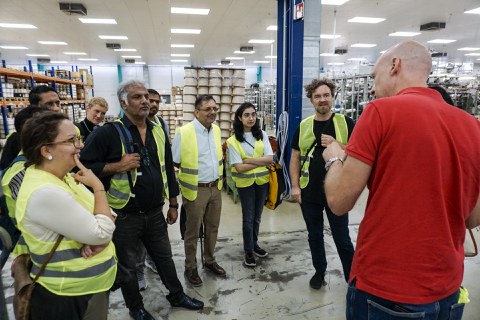
The delegation learns about the manufacturing processes at Noon GmbH in Limbach-Oberfrohna.
Throughout the week, the delegation visited several companies and institutions involved in sustainable textile production and recycling. Notable visits included the NOON GmbH textile factory, where the focus was on chemical use in textile dyeing and wastewater management, and the SOEX Recycling Germany GmbH plant, a pioneer in textile recycling. Additionally, the delegation engaged with experts from the German Environment Agency to discuss environmental standards in the textile and shoe sectors.
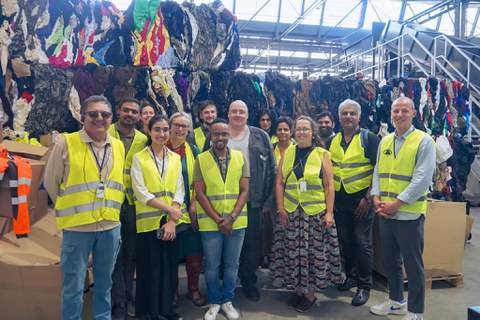
Visit of the expert delegation to SOEX GmbH in Bitterfeld-Wolfen, a pioneer in textile recycling.
With its rich agenda of discussions and site visits, this visit deepened the understanding of sustainable approaches in both Pakistan and Germany, inspiring the adoption of these methods in both countries. Furthermore, it strengthened collaboration among key stakeholders to support sustainability approaches. A summary report on the exposure visit will include lessons learned and suggestions for follow-up activities.
